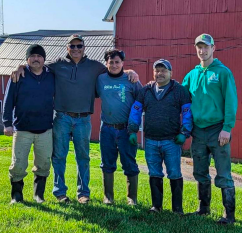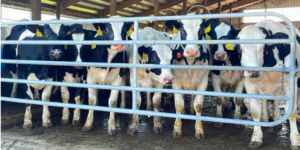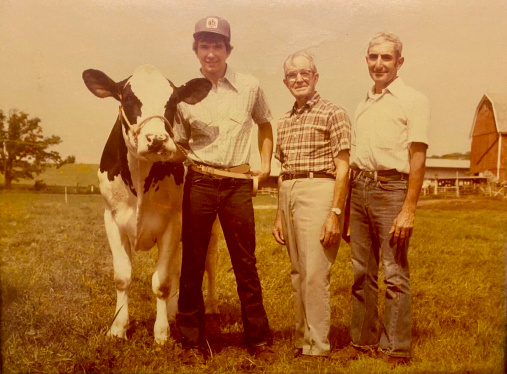Local Dairy Farm Switches to Being a Full-Time Crop Farm
By: Heidi Fuchs
Freshly cut wood is drug out of the woods by hand. Sleighs of horses haul the wood to and from the sawmill. The wood is then taken to the property to create great, big historic barns. Those barns are built entirely by the hands of a man who started it all on the corner of Marshall Road and Parker Road, 1.2 miles West of Dexter High School.
The current owner of the farm, Bruce Breuninger, said his “great grandfather bought the farm in 1909.” With cattle being around since the beginning, the farm didn’t begin selling milk until the 1940’s. This was just the start of a bright future for a dairy farm in the small town of Dexter.
In its prime, the farm had about 500 animals; 240 of them were milking cows, 30 were dry cows that were not producing offspring, and the rest were made up of youngstock which included the dairy calves.
The day would start bright and early at 5:30 in the morning for Bruce Breuninger and his workers. The workers would first start with milking the cows before moving onto scraping the floors and feeding the other livestock. While all this was happening, Breuninger would do the chores outside of the dairy barns. Around 10:30 or 11 a.m., the crop fields would be worked, the manure from the cattle would be hauled and spread onto the fields, and any other duties around the farm would be completed.
The cows would be milked a second time at 3:30 p.m. so that the employees “could get done at a decent hour and didn’t have to work around the clock,” Breuninger said. “[It] probably wasn’t the best for production, but, you know, gave us a lifestyle we wanted.” Typically, when milking a dairy cow, you would ideally milk them within a 12 hour interval to get the most milk possible out of the cows.

left), and his son, Zeke Breuninger (far right),
are pictured with the farm’s workers.
On the daily, the farm would ship out around 20,000 pounds of milk to places that would make it mainly into soft products. These products included cheese, sour cream, and cottage cheese. Sometimes the milk would become bottled to be sold in stores such as the local Kroger. Other times, the milk would be sent to Indiana to be made into cheese.
Breuninger Farms did belong to Michigan Milk Producers, a co-op that is a milk marketing cooperative and milk processor.
Breuninger’s cows were computer mated. Their co-op would send someone out to the farm to look at the cow, and then code her into their computer. They would find her a bull to match with. Then they used artificial insemination to breed their cows by using this computer matching system. Breuninger’s cattle were bred specifically for maximum milk production and to carry on the genes of his herd’s original bloodline.
The Switch
As of May 2023, the historic dairy farm of Dexter made the switch to being an all crop-based farm. With still a few head of cattle left, the Breuninger’s are moving completely away from the dairy industry.
“To be honest… I like doing my own thing,” Breninger said about the change, adding that he didn’t like being a boss and telling people what to do. He also said that it was hard because he was getting older.
With dairy farms, the owner has a lot on their plate, and it can be difficult to manage everything that has to happen throughout the long, busy days.
Another factor for the change was because of family. This lifestyle isn’t for everyone, and the heir to the throne had other plans in mind for his future. Zeke Breuninger, the son of Bruce Breuninger, has chosen to continue his career in Mixed Martial Arts fighting instead of taking over the family farm.
Now being mainly involved in the crop industry, the Breuninger’s have 620 acres of land to farm. Corn is their main cash crop, but they also grow soybeans, wheat, and alfalfa hay.
In his free time, Breuninger said that they will be spending time at their new cottage. Their new vacation spot is relatively close to Dexter so Bruce
can come home the next day to work. The Breuningers would like to travel to farther away places in the future when the cows are eventually all gone.


